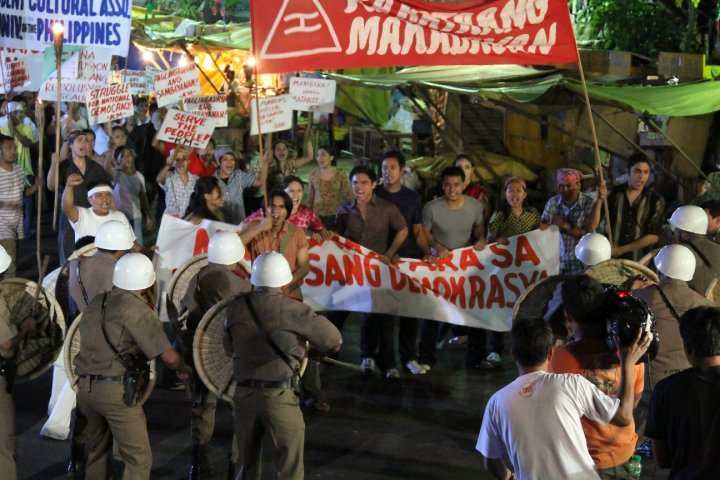Cinemalaya Film Festival has always been a significant avenue for works that are “social and political commentaries,” including martial law-themed movies that bagged major awards: Pisay (2007), Sigwa (2010), Aparisyon (2012), Respeto (2017), Liway (2018), and ML (2018).
PISAY won awards in 2007 for Best Director (Auraeus Solito), Best Production Design, and Audience Choice.
SIGWA’s Tirso Cruz III bagged the Best Supporting Actor in 2010.
APARISYON won Best Sound in 2012.
RESPETO won in 2017 seven awards: Best Film, Best Supporting Actor (Dido de la Paz), Best Sound, Best Editing, (Network for the Promotion of Asia Pacific Cinema (NETPAC ) Award and the Audience Choice.
LIWAY received in 2018 a special jury commendation and the audience choice. Kenken Nuyda earned Special Jury Citation for outstanding performance.
ML won Best Editing in 2018 along with Eddie Garcia as Best Actor.
PISAY revolves around teenage students of the Philippine Science High School (known as Pisay) during the politically volatile years of the Philippines in the 1980s.
Directed by Auraeus Solito and written by Henry Grajeda, the young students learned that they are neither isolated from the real world nor are they exempted from living real lives. They discover the world outside the four corners of the school and the chaos of the Marcos dictatorship erupting into the People Power revolution in 1986, being replicated within the school as they struggle to graduate.
It chronicles the students’ journey of self discovery as they go through the joys and pains of adolescence.

SIGWA, meaning “storm,” spans 40 years of Philippine social unrest. It centers on Dolly who returned to the Philippines after more than 30 years to know more about the daughter she left in the care of one of her friends. She reconnects to her friends in the most turbulent of circumstances: the first few years of martial law, including the infamous First Quarter Storm.
APARISYON is the story about the nuns in the period immediately preceding the declaration of martial law. One of the extern nuns leaves the monastery from time to time to help in the search of her missing activist brother.
RESPETO is an exploration of the Pinoy hiphop underground world where Hendrix (Abra), an aspiring young rapper from the slums, strikes an unlikely friendship with Doc (Dido dela Paz), a martial law poet who has long abandoned his art. As they cross paths, they turn to each other trying not to be swallowed by their circumstances.
RESPETO was cited “for its expert application of the resources of cinema to depict a teenager’s drive to rise above poverty and violence, its cogent melding of contemporary rap and traditional oral literature, and its sheer humanity and coruscating poetry” and “for tackling the complex issue of human rights violation across two generations, musically connected by the vibrant and socially-conscious use of language.”
Best supporting actor de La Paz was lauded “for his powerful portrayal of an old man haunted by the demons of his past and compelled to adjust to the present.”
LIWAY tells the story of the film’s director, Dakip “Kip” Oebanda, as a little boy growing up in a makeshift prison inside a military camp for both rebels and criminals during the waning years of the martial law era.

Glaiza de Castro plays the role of a young mother, Cecilia Flores-Oebanda, better known as Commander Liway, who uses storytelling, sings songs and plays with his imagination to protect her young son from the painful realities of prison life.
It received the Special Jury Commendation “for its timely subject matter and for its writer-director who courageously opened himself up to share with others his very revealing past.”
ML starred Eddie Garcia as a retired military general suffering from Alzheimer’s disease, leading him to believe that he is still living in the days of the Marcos’ dictatorship. He mistakes a visiting student (Tony Labrusca) and his friends as activists resisting the martial law, and captures and tortures the students, just as he did to activists back in the 1970s.
The group got more than what they bargained for when they decide to learn about the dark days of martial law straight from an old retired soldier who may be one of its worst abusers. He turned out to be a sadistic torturer who teaches them all about the horrors of the martial law era in the most gruesome way.
The movies, often called “indie films,” embody Cinemalaya’s vision: “the creation of new cinematic works by Filipino filmmakers’ works that boldly articulate and freely interpret the Filipino experience with fresh insight and artistic integrity.”
Cinemalaya festival director Chris B. Millado referred to filmmakers as culture-bearers “cutting through noise” of social media, revised histories, misinformation and disinformation, personal anxieties, and international goings-on.
Atty. Dennis R. Gorecho heads the seafarers’ division of the Sapalo Velez Bundang Bulilan law offices. For comments, e-mail [email protected], or call 0917-5025808 or 0908-8665786









